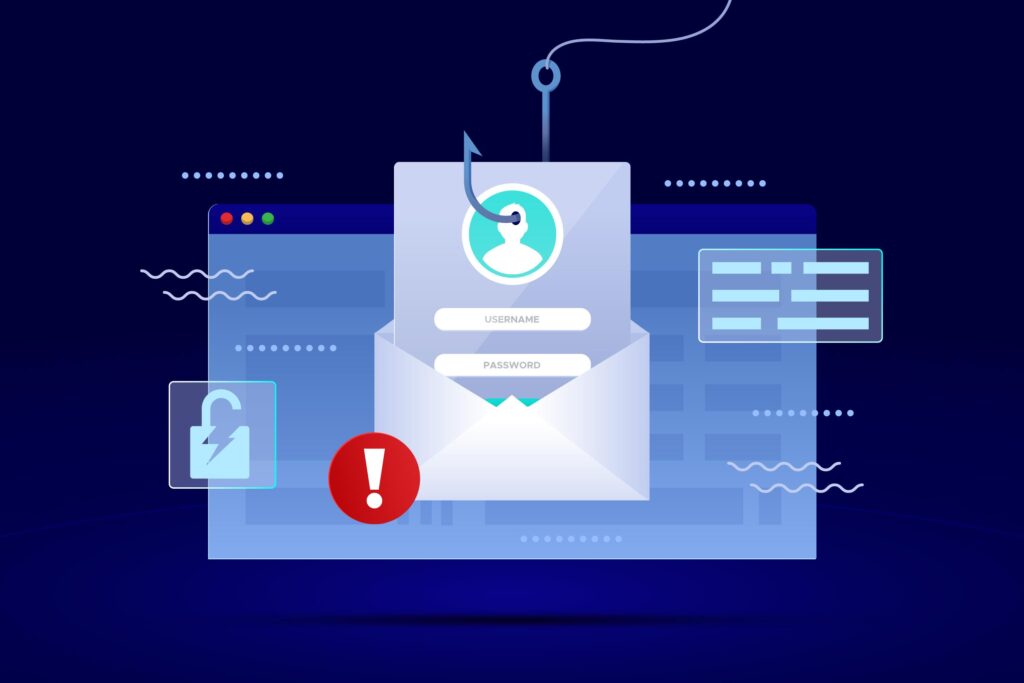Phishing attacks have targeted businesses of all sizes since they first emerged alongside the development of the internet. The ease of access to the internet today makes it much simpler for scammers to prey on organizations, and the results can be negative. To secure their staff, clients, and businesses, brand owners need to build up effective phishing defenses.
In this blog post, we’ll discuss the best practices for keeping your business protected from phishing attacks.

What are Phishing Attacks?
Phishing attacks are a type of cybercrime that con artists employ to get people to click on malicious websites, give personal information, etc. Phishing scams can target whole businesses, and it only takes one employee to open a bad link to do permanent harm.
Phishing has never been more dangerous to brands due to the rise in remote employment, online purchasing, and digital branding brought on by the internet. Scammers may set up and attack in only a few minutes, so businesses need to be prepared.
If you want to know more about how to recognize phishing and what to do if you’ve been successfully phished, read our last week’s post.
9 Best Practices to Protect Your Business from Phishing Attacks
IT teams can prevent phishing assaults from reaching employees’ inboxes by using the right tools and security measures.
- Install Security Software
Your first line of protection against phishing schemes should be the installation of security software. Programs like firewalls, spam filters, and antivirus software are quite successful at preventing phishing attacks. Web filters can also be used to prevent employees from visiting malicious websites.
- Keep Software Updated
Maintaining software up to date with the most recent security patches and upgrades also reduces your risk of falling victim to a phishing scam. Plan frequent upgrades and keep an eye on the status of all software and hardware.
The FTC suggests updating the following:
- Security software
- Operating system software
- Applications and web browsers
- Build a Strong IP Portfolio
Any online phishing that takes place involves stealing a company’s identity. Having said that, the secret to safeguarding your business is to make sure your intellectual property is fully and comprehensively covered.
Don’t forget anything because standard phishing involves online criminals impersonating your company’s website, web design, social network accounts, and more. Your domain name, copyright, and social media presence are the three primary things you’ll need to watch over and protect.
- Enforce Password Policies
Maintain rules governing acceptable passwords as well as procedures to enforce password expiration. Minimum password length, special characters, and numbers all contribute to the creation of complicated passwords that are harder to hack.
- Use Multi-Factor Authentication
Logging into corporate accounts requires two or more credentials. By implementing multi-factor authentication, you may stop hackers from accessing your systems even after they have stolen a user’s login information.
- Schedule Regular Backups
How recently did you test your backup and recovery strategy? You probably need to do it now if you can’t recall. Making regular backup plans makes it easier to guarantee that your data will be completely recoverable in an emergency.
- Protect Remote Workers
If you have staff who work remotely, establishing a BYOD (Bring Your Own Device) policy is crucial for defending your email against phishing attempts. To restrict access to phishing websites, mandate encryption for remote workers and connect them to your server via a VPN.
- Educate Your Employees and Customers
When it comes to phishing attacks, knowledge is power. It will be far more challenging for scammers to succeed if you have open communication with your audience, staff, and customers. Inform all your channels about the phishing risks they can encounter and the best ways for them to stay safe.
- Report Malicious Behavior to the Platform
As soon as you witness something, be sure to notify the platform where it’s occurring. If left unattended for too long, social media impersonation and other phishing attacks can be damaging to your brand, therefore they need to be handled right away.
Use the existing reporting mechanisms on the platform to make sure scam ads, false direct messages, and other issues stop.
Take proactive measures to protect your business against phishing attacks by outsourcing your IT functions to a trusted provider. Contact us today to secure your data, maintain business continuity, and stay ahead of cybercriminals!
- AI in IoT: Benefits, Components, and Impact - April 10, 2025
- AI and Low-Code/No-Code: A New Era of Development and Innovation - February 25, 2025
- The Ultimate Guide to AI in IT Support: The Tools, Benefits & Challenges You Must Know - February 11, 2025
